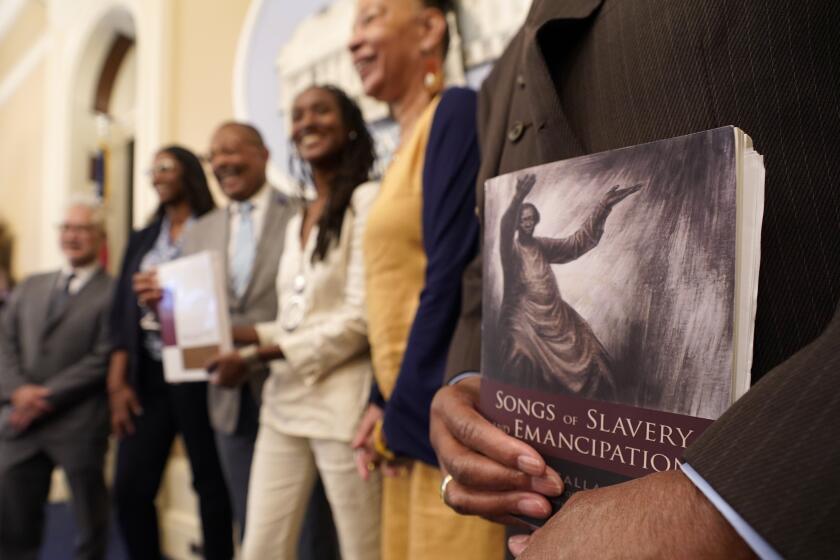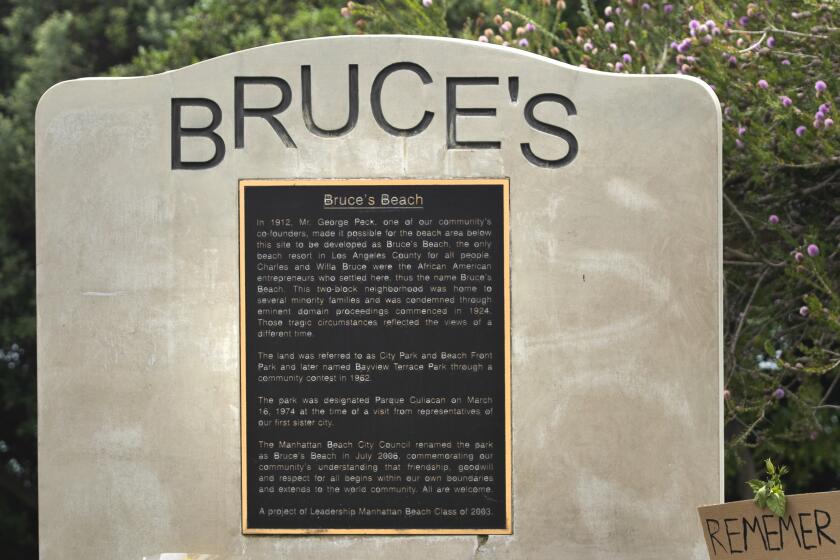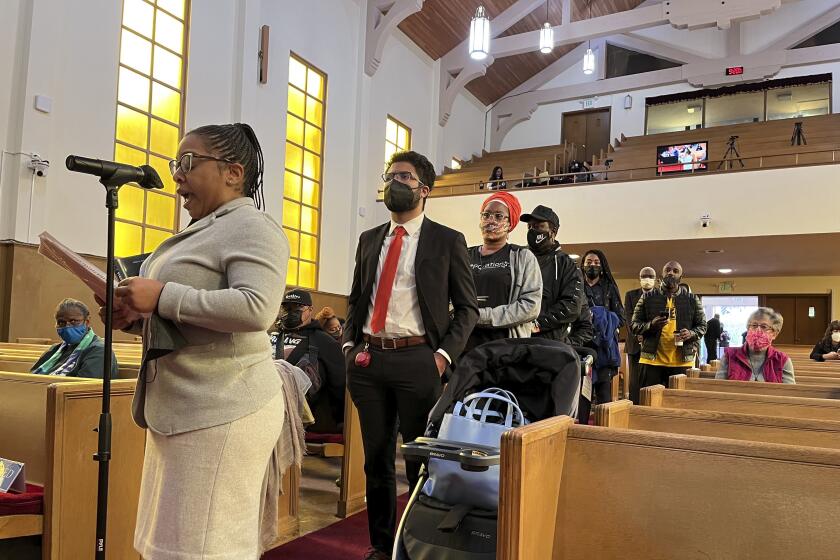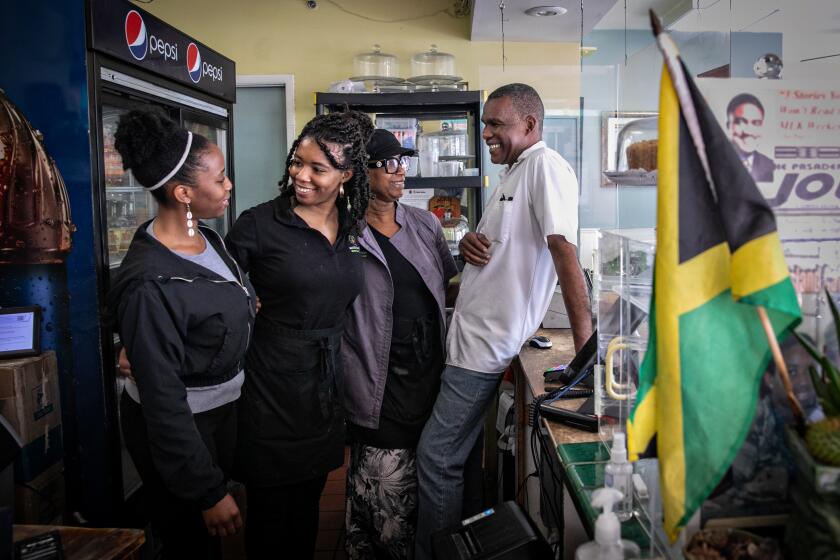Editorial: Why skeptical Californians should rethink cash reparations for slavery
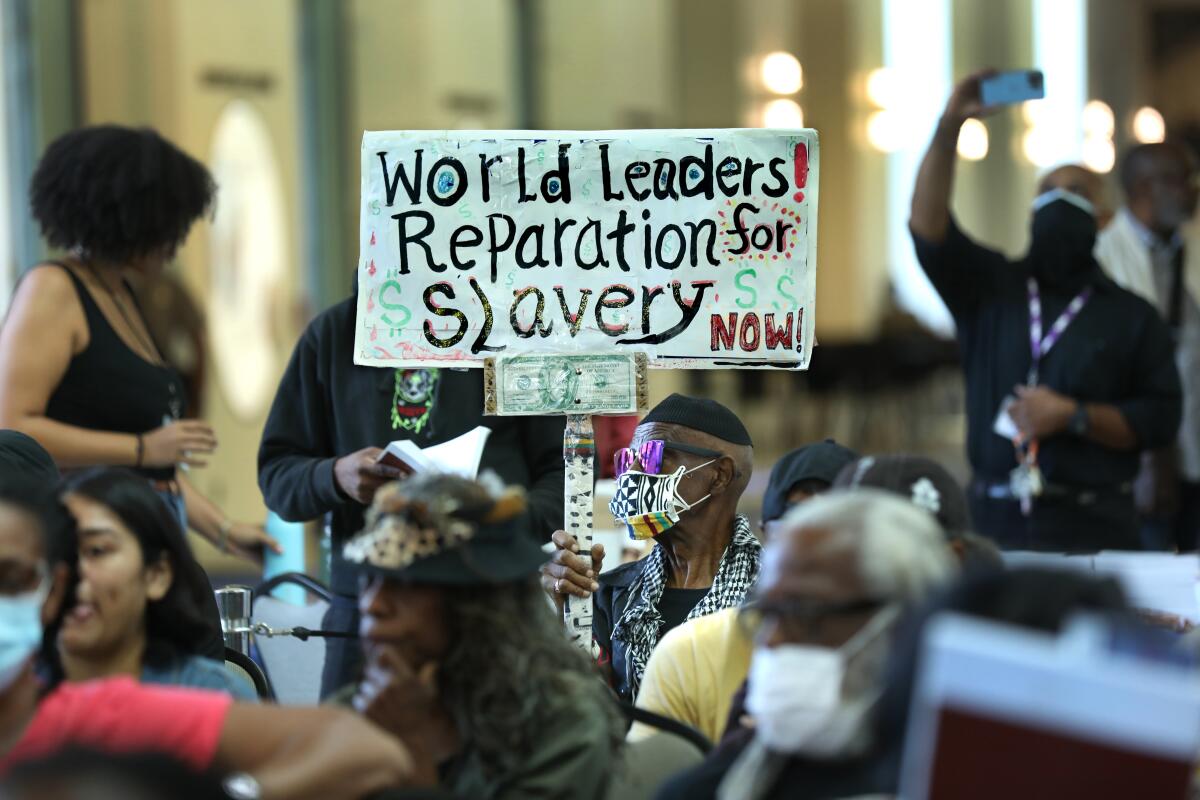
According to a new poll, 59% of California voters surveyed do not approve of cash reparations for the descendants of enslaved Black people.
When asked why, and given five answers to choose from, most picked this: āItās unfair to ask todayās taxpayers to pay for wrongs committed in the past.ā The poll was conducted by the UC Berkeley Institute of Governmental Studies and co-sponsored by The Times.
Thatās concerning, since the state Legislature and Gov. Gavin Newsom are embarking on the huge task of poring over a 1,000-plus page report from a statewide task force that made dozens of recommendations for reparations including cash compensation.
But itās not surprising. Americans learn little in school about the long-term consequences and costs of chattel slavery and institutionalized racism on generations of Black Americans. In some states, teachers arenāt even allowed to talk about the history of race in America. In Florida, public school students can now be taught, preposterously, that in some instances slaves developed skills that could be used āfor their personal benefitā ā as if any skill a slave picked up compensated for being enslaved.
Efforts to expose racism in schools and policies are attacked as racist and shut down. No wonder people donāt understand the history of slavery and racism in this country.
Allow us to educate California voters a little.
The reparations task force has been working for two years on a plan to readdress the generational effects of racism and slavery on Black Californians. Their report must not get shelved. This is too important.
Obviously, no one today is a legal slave owner in the U.S. Nor was anyone alive today involved in reneging on the promise to grant freed Black slaves land in the 1860s.
But everyone alive today in the U.S. lives in a country where slavery was a horrific and sustained crime that morphed with its abolition into myriad forms of institutional racism that persist to this day ā including in California.
Maybe the poll takers didnāt know that hundreds of Black residents (along with Latino, Filipino, Indigenous and some white residents) in an area of Palm Springs called Section 14 were forced out and had their homes burned down ā in the 1950s and 1960s. Of about 1,000 plaintiffs who are part of a $2-billion claim that attorney Areva Martin has filed against the city, 350 are actual survivors of what a 1968 state investigation called āa city-engineered holocaust.ā
Of course Manhattan Beach and Los Angeles County should return Bruceās Beach to the family from which it was wrongly taken, or else pay for the land. This kind of acknowledgement and reparation necessarily raises all kinds of questions about thefts from others, including land from indigenous Californians and labor and dignity from Black Americans, but the controversy over those questions is no reason to slow redress for the historically recent racist taking of the Brucesā land.
Or perhaps they didnāt know that in the early 1900s Willa and Charles Bruce were run off their property overlooking the ocean in Manhattan Beach that was a popular lodging and dining spot for Black families, known as Bruceās Beach.
A year ago, the L.A. County Board of Supervisors voted to return the land to the Bruce family descendants. Supervisor Holly Mitchell made it clear the decision was not a gift: āWe arenāt giving property to anyone today. We are returning property that was erroneously taken from the Bruces based on fear and hate.ā
The poll participants seemed to have some understanding of the lasting effects of slavery on Black Californians today. Sixty percent answered that they do believe the position of Black residents has been harmed to at least some degree.
Reparations discussions often focus on the racial wealth gap. What about the racial health gap?
Educating Californians on the stateās role in slavery and institutionalized racism ā and why there should be a price literally to pay for it ā will be part of the challenge lawmakers face as they work to design a plan for reparations for African American residents in the state who qualify.
Itās important that Californians find out more about the effects of slavery in a state that outlawed it in 1849 but didnāt enforce the ban.
Black Californians have suffered discrimination in education, employment, healthcare, the criminal justice system and in housing, which has translated into a devastating lack of generational wealth. Before 1900, federal and California Homestead Acts āessentially gave away hundreds of millions of acres of land almost for free mostly to white families,ā the report says. Discriminatory bank lending policies and zoning ordinances kept Black people from acquiring property in neighborhoods where they wanted to live ā or from acquiring it at all.
The reparations debate remains one of the hottest topics in town, particularly in communities like Crenshaw, Leimert Park and Inglewood ā the heart of Black L.A.
As a result, Black families have been thwarted in their efforts to create the most common form of wealth ā a home to pass on to the next generation. The results are stark: Black families today are in far worse financial straits than their white counterparts. How much? According to a 2016 study, the median value of liquid assets for native-born African American households in the U.S. was $200, compared with $110,000 for white households.
Thatās why compensation in some form for past harms that linger to this day must be something that the state lawmakers consider seriously. To do anything less would be irresponsible.
Assemblyman Reggie Jones-Sawyer (D-Los Angeles), who sat on the task force that produced the report, said educating the public about the recommendations, which include many non-cash reparations, is crucial. He said the Legislatureās Black Caucus will raise money to hire experts to create compelling presentations of the history of Black Californians and the justification for reparations of some kind.
Thatās a smart idea. There will be plenty of polls to come that will offer data points with little context and may even contradict each other. For example, a poll released in May by the Ralph J. Bunche Center at UCLA found that 63% of Californians do support cash reparations.
Ultimately, whatever form reparations might take should be based on thoughtful informed decision-making, not a popularity poll.
More to Read
A cure for the common opinion
Get thought-provoking perspectives with our weekly newsletter.
You may occasionally receive promotional content from the Los Angeles Times.
